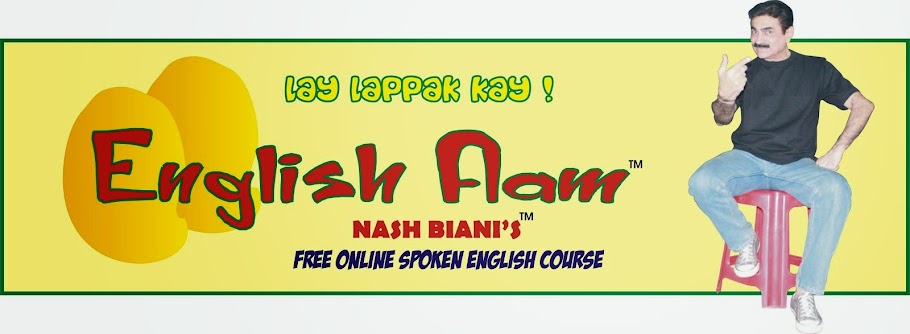English Aam Kulfi
Mast Mast !
SEASON 1
No 1
Neelam and Parvez :
Apples and Onions (Page 1)
No 1
Neelam and Parvez :
Apples and Onions (Page 1)
Learning to speak English with fun in an easy to understand way with simple grammar
Hello, everybody! With this post we start a series of fun and interactive lessons within our overall programme of spoken English - English Aam. This series will be a part of our programme and will be called English Aam Kulfi. Why this name? Well, I think we all love kulfi and my favourite kulfi is mango kulfi or, as we say, Aam Kulfi. This series is intended to be interactive as much as possibe. This means that you will have to participate in the lessons. How? You will know as we go along. Please let me know how you like it.
By the way, we are now on Facebook so please follow on the pages there. We are also on Twitter so please follow on that site too. If you look on the panel on the right of this page, buttons have been provided for both Facebook and Twitter. Please click on these buttons right now, one after the other and start following on both these sites for more fun!
Now, many of you must have seen the post on Facebook where you were asked to translate a small conversation between Neelam and Parvez. Remember these friends from our earlier English Aam video mehfils? Well, they were away for some time but they're back now and we hope to see more of them. Of course, some other people will also be joining us very soon on English Aam Kulfi -Mast Mast!
The translation of this conversation can be done in quite a few ways. However, we will try to have as informal and natural a language in our translation as possible. Also, remember that when we translate from one language into an other, the translation doesn't have to be exact. What I mean is that some words or idioms may be used which are not the exact meanings found in bi-lingual dictionaries, that is, dictionaries from one language into an other.
This conversation can be translated as:
Neelam: Onions are costlier than apples.
Parvez : I know.
Neelam: What will we do?
Parvez : We'll sauté apples and make a gravy.
Neelam: Oh?
Parvez: Yes. And we'll make onion milkshake.
Neelam: Great!
Now, this is not the one and only way to translate this conversation. For example:
Onions are costlier than apples.
Onions are more expensive than apples.
Onions cost more than apples.
What will we do?
What are we going to do?
We'll sauté apples and make a gravy.
We'll fry apples and make a gravy.
Great!
Fantastic!
Using this conversation to Learn English grammar and usage while speaking English
I'd like to discuss a few things here. It is obvious that Parvez is joking about the whole thing.
When Neelam says "achcha?" in English, she is not saying 'good'. If she were to say, "Yeh sandwich achcha hai." that would translate as, "This sandwich is good." or "This is a good sandwich." Here, when she says "achcha?" her tone indicates what would translate as "Oh?" in English.
Then, Parvez uses the word 'sauté'. This is pronounced सौतेई (that's the closest I can get in Hindi). The meaning of this word is to fry something in oil or butter till it becomes brown.And that's what we do to onions for the gravy base. So, I think for 'bhun-na' that would be appropriate. For 'tal-na' the word would be 'fry'.
Also, notice that when Neelam says,"Great!" she doesn't really mean that Parvez's idea is very good.
Here, she is being sarcastic. A person is being sarcastic when she or he says something but actually means the opposite.This is understood from the tone in which the person speaks and the context in which the statement is made.In this conversation, Parvez's ideas are clearly foolish. So, when Neelam says,"Great!" she actually means "Stupid!"
Collocations for practising to speak English
Write the following in your English Aam Spoken English Collocations Book and practise them by speaking aloud.
1. costlier than
2. more expensive than
3. cost more than
4. What will we do?
5. What are we going to do?
Translate into English: Angrezi mein anuvad yaniki tarjuma karen
Neelam: Pyaaz apple se mehengi hain.
Parvez : I know.
Neelam: Hum kya karenge?
Parvez: Hum apple ko bhoon kar gravy bana lenge.
Neelam: Achcha?
Parvez : Haan, aur pyaaz ka milkshake banayenge.
Neelam: Badhdhya!
from: English Aam on FacebookParvez : I know.
Neelam: Hum kya karenge?
Parvez: Hum apple ko bhoon kar gravy bana lenge.
Neelam: Achcha?
Parvez : Haan, aur pyaaz ka milkshake banayenge.
Neelam: Badhdhya!


